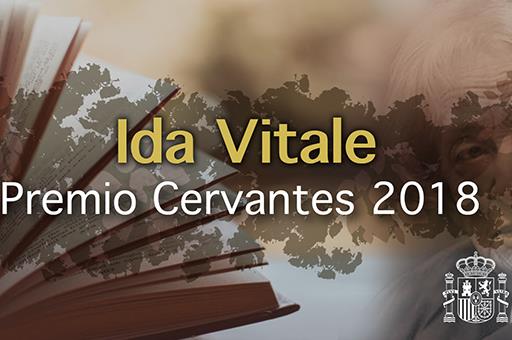The Jury decision was announced at an event held at the Ministry's headquarters by the Minister for Culture and Sport, José Guirao, accompanied by the chair of the jury, Carme Riera and the 2017 Cervantes Prize Winner, Sergio Ramírez.
The jury granted the prize to Vitale "for her language, among the most outstanding and appreciated in modern Spanish poetry, which is at the same time intellectual and popular, universal and personal, transparent and deep. She has for some time now been a key reference for poets of all generations and wherever Spanish is spoken."
The jury's decision concludes that "This prize recognises a career as poet and intellectual (critic and translator) of the first order."
The jury
The jury was composed of Carme Riera, representing the Royal Spanish Academy; Rafael Ángel Rivas, of the Venezuelan Language Academy; Aurora Egido, of the Association of Rectors of Spanish Universities (Spanish acronym: CRUE); Francisco Pérez-Arce, of the Union of Latin American Universities (Spanish acronym: UDUAL); Martín López-Vega, of the Instituto Cervantes; José Manuel Blecua, proposed by the Ministry of Culture and Sport; Concha Barrigós, of the Spanish Federation of Journalist Associations (Spanish acronym: FAPE); Norma Valle of the Latin American Federation of Journalists (Spanish acronym: FELAP); and Christoph Strosetzki, of the International Association of Hispanists.
Also present were the two last authors to receive the award, Eduardo Mendoza (2016) and Sergio Ramírez (2017). The secretary of the jury (with a voice but no vote) was the Director-General for Books and the Promotion of Reading, Olivido García Valdés; and the secretary of the minutes (with voice but no vote), the Sub-Director General for Book Promotion, Reading and Spanish Literature, Begoña Cerro.
Biography
Born in Montevideo, Uruguay, in 1923, Vitale is one of the great Latin American poets and the last survivor of the exceptional "generation of '45", which was included such notable intellectuals as Emir Rodríguez Monegal, Ángel Rama (her first husband), Mario Benedetti, Caros Maggi, Manuel Claps and María Inés Silva.
She has received numerous awards as poet, essayist, literary critic and translator, among them the International Octavio Paz Prize for Poetry and Non-Fiction (shared with Ramón Xirau) in 2009; the Carlos Monsivais Prize for Cultural Merit of the City of Mexico and the international Alfonso Reyes Prize, both in 2014; the Reina Sofia Prize for Ibero-American Poetry in 2015; the Federico García Lorca Prize in 2016; the Max Jacobs Prize (Paris) in 2017; and the Feria del Libro de Guadalajara Prize in 2018.
Author of La luz de esta memoria and Procura de lo imposible, the work of Ida Vitale demonstrates a precise and malleable language charged with irony and subtlety, intelligent and with a strong influence from Juan Ramón Jiménez, whom the poet herself considers her master in poetry.
Throughout her life Ida Vitale has collaborated with numerous periodicals such as the daily newspaper El País, the weekly review Marcha, the magazine Clinamen (of which she was co-editor), the weekly review Jaque (of which she was later editor of its cultural section), the magazines Plural and Vuelta, and the daily El Sol and Diorama el la Cultura (the cultural supplement of Excélsior).
During her life she has laid down roots in a number of countries. Forced to emigrate by the dictatorship, she went to Mexico (where she developed an intense literary activity and was teacher of literature at the prestigious El Colegio de México); she also lived for some time in Paris, France, on a study grant; and although she returns from time to time to Uruguay and Mexico, since 1990 she has lived in the United States.
History of the prize
The award of this prize, worth 125,000 euros, is an annual public demonstration of admiration for a writer who has contributed over his or her whole work to enrich the legacy of Hispanic letters.
Any author whose literary work is written wholly or substantially in Spanish is eligible for the Cervantes Prize. Candidates to the Prize may be presented by the Academies of the Spanish Language, previous prize winners, institutions that by their nature, purpose of content are linked to the literature in Spanish, and by the members of the Jury.
The list of former prize winners constitutes a clear demonstration of the meaning of the Prize for culture in the Spanish language:
1976 Jorge Guillén
1977 Alejo Carpentier
1978 Dámaso Alonso
1979 Jorge Luis Borges y Gerardo Diego
1980 Juan Carlos Onetti
1981 Octavio Paz
1982 Luis Rosales
1983 Rafael Alberti
1984 Ernesto Sábato
1985 Gonzalo Torrente Ballester
1986 Antonio Buero Vallejo
1987 Carlos Fuentes
1988 Maria Zambrano
1989 Augusto Roa Bastos
1990 Adolfo Bioy Casares
1991 Francisco Ayala
1992 Dulce María Loynaz
1993 Miguel Delibes
1994 Mario Vargas Llosa
1995 Camilo José Cela
1996 José García Nieto
1997 Guillermo Cabrera Infante
1998 José Hierro
1999 Jorge Edwards
2000 Francisco Umbral
2001 Álvaro Mutis
2002 José Jiménez Lozano
2003 Gonzalo Rojas
2004 Rafael Sánchez Ferlosio
2005 Sergio Pitol
2006 Antonio Gamoneda
2007 Juan Gelman
2008 Juan Marsé
2009 José Emilio Pacheco
2010 Ana María Matute
2011 Nicanor Parra
2012 José Manuel Caballero Bonald
2013 Elena Poniatowska
2014 Juan Goytisolo Gay
2015 Fernando del Paso
2016 Eduardo Mendoza
2017 Sergio Ramírez
Non official translation





